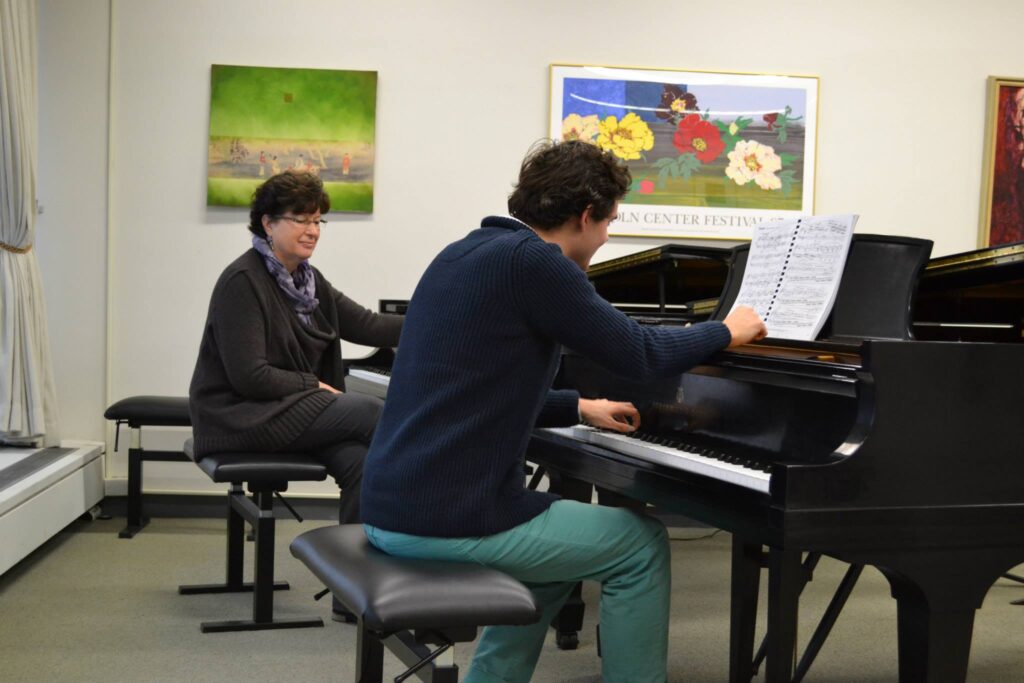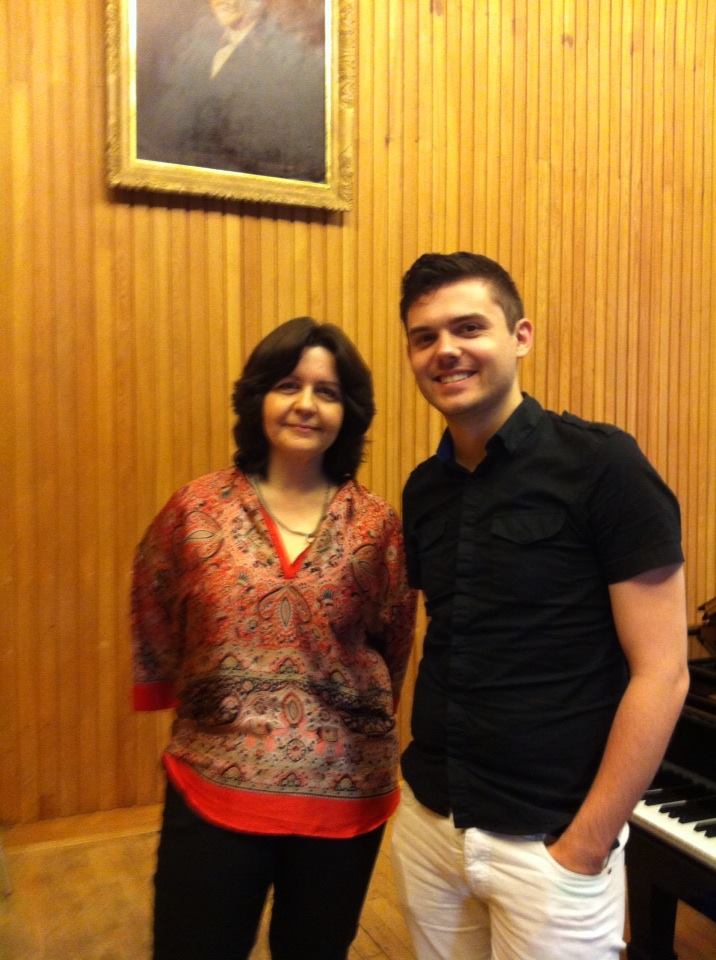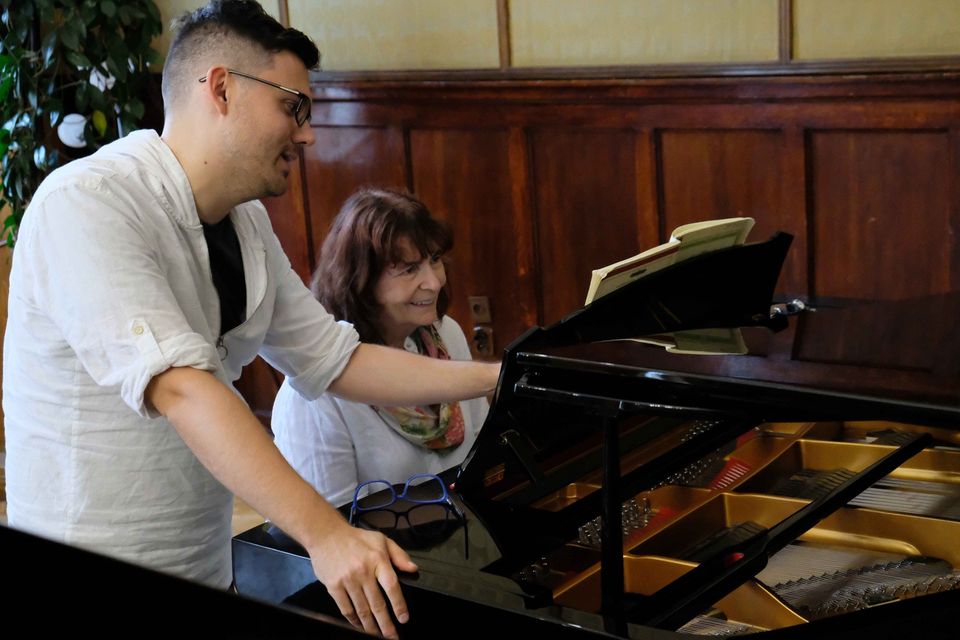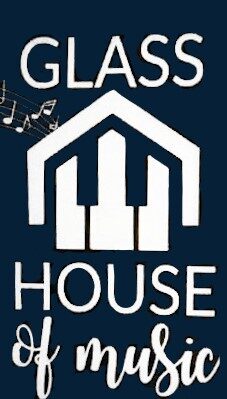While Jarred Dunn has achieved a high level of playing, he doesn’t just sit on his laurels. He is always looking to improve. For many of us, when we think of piano lessons, we imagine little children clunking away, or maybe a pre-teen trying to master a popular tune. But professional performers know there is always room for improvement, and they seek out guides that can help. In our last post on Jarred Dunn, here are some of his thoughts on being a student of piano.
If you had to pick the three most influential teachers you’ve had, who would they be and why?
Jacob Lateiner taught me how to read scores. He studied with Schoenberg, commissioned new music, and was a sensational performer. He was all about the music. I studied with him from 2007, until his death in 2010.
Veda Kaplinsky re-taught a sustainable technique and told me what a music career really involves. She taught me how to play effortlessly while being sensitive to the music. I met her in 2010 and I studied with her until I moved to Poland in 2014. I continued to play for her on and off until as recently as a month ago.
Dorothy Taubman taught me how to analyze the playing movements with her so-called “X-ray vision”, which I now use to diagnose technical problems. She showed me how to use the 4th and 5th fingers for the Chopin étude op.10, no.1, so that it was playable in 30 seconds! I had about 12 lessons with her in 2012, but she passed away in 2013.
How did you get connected with these teachers?
I contacted Lateiner, asking him if I could play for him before I had my audition for Juilliard. I had tried to contact Kaplinsky, but never heard back from her (she’s always so busy). One day after I’d just had a lesson, I saw her standing at the door of the studio beside Lateiner’s and I approached her.
When I was doing my undergrad in Toronto, I wrote an essay on Dorothy Taubman. Later, I heard she was still teaching seminars and so I contacted her. I felt lucky then to have contact with these great teachers, but this all became a phase because soon I got the invitation of a lifetime and my circumstances changed.
Would you be able to tell us about a few of your teachers in Europe?
I flew to Warsaw to perform and participate in some master classes, one was with Anna Górecka, who is the daughter of the composer Henryk Mikołaj Górecki. She had a different take on the technical issues my former teacher addressed. Piano came naturally to her and she described it in artistic terms, stressing that technique is simply the means to produce beautiful sound. After my first class with her, we talked about my career goals and she invited me to study with her at Academy of Music in Katowice, Poland. I thought for five seconds and knew this was the moment: about a month later I was moving to Poland and I studied with her for four years. My fourth year, I began lessons with Katarzyna Popowa-Zydrón (head of the Warsaw Chopin Competition jury) in Bydgoszcz Academy, where I later took my Artist Diploma.
Anna Górecka eventually asked me to be her assistant and to teach her students when she was on tour. This was vital for me, all of her students were fantastic and serious about their studies. They came to their first lesson prepared to be work on complex repertoire. It required me to have more than just technique to teach them, because the music was already in their fingers.
What Katarzyna Popowa-Zydroń taught me could fill several volumes. She’s one of the most intuitive people I’ve met and she knows how to listen. Her example taught me to be quiet and wait for the music to reveal itself before I do anything to it, and likewise to listen to my student carefully before I instruct. It is impossible to sum up because her teaching is so ingeniously specific that it feels like she knew me much longer than just the two years of my studies. She’s really a perfect professor.
Do you still practice every day?
Yes.
For how long?
Between 3-6 hours.
Does it ever feel like a chore you just don’t feel up to, or do you always look forward to that part of your day?
No, because if it did I probably just wouldn’t practice! It all depends on my mood. At least with a minimum of 3 hours I know I have accomplished what I need. If I’m in a fiery mood to work and am very inspired, then I can go for as long as 6.
Do you break up the practice time throughout the day?
Yes, although during my master’s in Katowice (Poland) I would often do it all at once since I had to obtain a key for the practice rooms in the school and it was preferable to do all the main work in one lengthy session. Now I do my best practicing in the morning for two hours, before I go for a jog in the lovely part of Montréal where I live. I always practice before I teach.
Have you ever come to any cross-roads in your career?
No. I was not sentimentally attached dreams about where I would go with my studies. If an opportunity felt right, I took it. I had the opportunity to pursue my doctorate at Juilliard, but McGill offered a great funding package and the allure of living somewhere I hadn’t lived before, not to mention coming home after a long time away. McGill is a more research-oriented school, and I wanted to develop my academic side along with my playing, so this was a logical choice. Now that I’m teaching at McGill it feels even more right.
What is the simplest way to summarize your view on teaching and performing?
If you listen and practice according to who you are, you become your greatest inspiration . You understand and identify with yourself more than anyone else. Any teacher knows that if they are imposing their view of the music on their students, something is wrong: we teach to inspire and ignite what is already in the student: ‘We play the way we are.’ The great performers invite us into their world, they’re not forcing us into it. They are uncompromisingly themselves, and this is the most inspiring thing. A music education – which I believe is something everyone should have – is the way to find this part of ourselves.
With Veda Kaplinsky (Juilliard 2013):

With Anna Gorecka in Warsaw, 2014 (the master class that changed everything):

With Katarzyna Popowa-Zydron (Bydgoszcz 2019):

